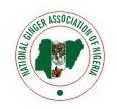The Nigerian ginger industry has rapidly gained recognition in the global spice market, thanks to the country's ideal climate and fertile soil. As a leading producer of ginger in Africa, Nigeria holds vast potential for expanding its export presence. However, challenges such as infrastructure deficiencies, price volatility, and competition from other ginger-producing nations pose significant hurdles. This article delves into strategies for Nigerian ginger producers to tap into new markets, overcome challenges, and boost their global export revenue.
The global ginger market is experiencing unprecedented growth due to the rising consumer demand for health-beneficial spices. The market's expansion is driven by ginger's increasing use in food, beverages, and health products. Understanding these dynamics is crucial for Nigerian producers aiming to capitalize on global opportunities.
Identifying and targeting the right markets is essential for boosting Nigerian ginger exports. Key importers such as the European Union, the United States, and Japan present significant opportunities for Nigerian producers. These markets are particularly promising due to their demand for organic and specialty ginger products.
Consumer preferences are evolving, with a marked shift towards natural and organic products. This trend is particularly strong in markets like North America and Europe, where ginger is valued for its anti-inflammatory and digestive health benefits. Nigerian producers must align their products with these trends to meet international demand.
Price fluctuations in the ginger market are influenced by various factors, including climate conditions and global competition. Understanding these dynamics and implementing strategies to mitigate their impact is crucial for Nigerian producers to maintain profitability in the global market.
Nigerian ginger producers have the potential to explore and penetrate emerging markets. The Middle East, Europe, and North America are particularly promising due to their growing demand for high-quality and organic ginger products. By conducting thorough market potential analysis, producers can identify and target these lucrative markets.
In emerging markets, consumers are increasingly prioritizing organic, fair-trade, and specialty ginger products. By catering to these preferences, Nigerian producers can differentiate their offerings and appeal to a broader customer base. Understanding consumer demands is key to crafting effective marketing strategies.
The global ginger market is highly competitive, with each region presenting unique challenges and opportunities. For Nigerian producers, understanding the competitive landscape and positioning themselves effectively is critical to gaining a foothold in international markets.
Nigerian ginger has the potential to thrive in niche markets, such as organic ginger and ginger oil extracts. These specialized products are in high demand, particularly in the food, beverage, and cosmetics industries. Targeting these niches can open new revenue streams for Nigerian producers.
To succeed in the global market, Nigerian ginger exporters must overcome infrastructure challenges. Efficient logistics, export documentation, and certification are vital components of a robust export strategy. Addressing these issues can significantly improve the competitiveness of Nigerian ginger in international markets.
Nigerian ginger exporters face various challenges, including inadequate infrastructure, regulatory hurdles, and quality control issues. By tackling these challenges head-on, producers can enhance their export capabilities and ensure consistent quality to meet international standards.
Compliance with international quality standards is non-negotiable for accessing global markets. Nigerian ginger producers must adhere to ISO standards, Good Agricultural Practices (GAP), and other relevant certifications to ensure their products meet global expectations.
Post-harvest handling and processing play a crucial role in maintaining the quality of ginger for export. Proper drying, grading, and packaging techniques are essential to preserve ginger's freshness and appeal in the global market. Nigerian producers must adopt best practices in these areas to enhance their competitiveness.
Collaboration is key to success in the global market. Nigerian ginger producers can benefit from partnerships with exporters, importers, and distributors to expand their reach. Building relationships with key stakeholders can facilitate smoother market entry and improve export outcomes.
The Nigerian government offers various programs and incentives to support ginger exporters. By leveraging these resources, producers can reduce costs, access market intelligence, and participate in trade missions. Government support is instrumental in enhancing the export capabilities of Nigerian ginger producers.
In the digital age, having a strong online presence is crucial for reaching international customers. Nigerian ginger producers should invest in website development, social media engagement, and e-commerce platforms to expand their market reach. Digital marketing strategies can significantly boost visibility and sales in the global market.
Examining the success stories of Nigerian ginger exporters provides valuable insights into best practices and strategies for overcoming challenges. By analyzing these case studies, other producers can adopt proven methods to enhance their export performance.
The future of Nigerian ginger exports is promising, with significant opportunities for growth in the global market. By addressing challenges, exploring new markets, and enhancing quality standards, Nigerian producers can expand their export footprint and increase revenue. Collaboration and continuous improvement are key to unlocking the full potential of the Nigerian ginger industry.
Nigerian ginger producers and stakeholders must take proactive steps to capitalize on the growing global demand for ginger. By working together, they can overcome challenges, seize opportunities, and drive the industry forward, ensuring that Nigerian ginger remains a dominant player in the global spice market.
To get more information from an active community of ginger business personalities, join the National Ginger Association of Nigeria.
